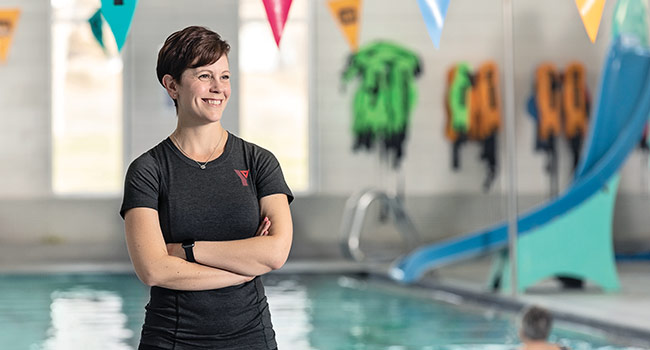Looking to build a meaningful career helping others overcome injuries or impairments? This diploma equips you with practical skills in four key therapy areas. Graduate ready to become a versatile member of today’s collaborative health-care teams and meet strong industry demand for therapy and rehabilitation professionals.
In April 2022, the NorQuest Interdisciplinary Therapy Assistant Diploma Program was proud to receive the Colleges and Institutes Canada (CiCan) Gold | The Program Excellence Award.

NorQuest was a great experience and I’m very proud of what I was able to accomplish. And I’m looking forward to accomplishing more in the future!
What to expect from the program
The program delivers theoretical knowledge and hands-on skills through a balance of discipline-specific and interdisciplinary courses.
You will learn occupational therapy and physical therapy assistant skills, along with essential assistant-level techniques in speech-language therapy and therapeutic recreation. Coursework includes practical labs and team-based learning to develop your ability to support clients in diverse rehabilitation settings.
Program graduates will be prepared to:
- Communicate and collaborate as a valuable member of a client-centred interdisciplinary health-care team
- Assist with effective physical therapy and occupational therapy practice by providing safe and competent care across client populations
- Support other rehabilitation disciplines, including therapeutic recreation and speech-language pathology
- Demonstrate effective professionalism, leadership, and reflective practice skills
Graduate with experience
NorQuest College believes in the importance of on-the-job experience that provides an enriched learning opportunity.
You’ll graduate from this program after completing five practicums with a minimum of 150 hours in each discipline.
Your practicum may be in your community or close by. Your schedule may include day, evening, or weekend shifts. You will take part in a full-time practicum and must arrange your own transportation to and from the facility.
Choosing your delivery option
NorQuest understands that students have different learning styles and preferences. This program includes two delivery options. When determining how and where you would like to attend classes or complete your program, consider how you learn best.
In person - 2 years
Classes are held in a classroom with face-to-face instruction and regularly scheduled meeting times.
- Due to course load, this option is best suited for students who can commit to full-time studies each term.
- All courses must be taken in the preplanned order.
- Attendance to all lab components is mandatory.
Online with in-person labs - 3 to 4 years
A mix of “online real time” with live online classes with scheduled times and deadlines and “online anytime” where you study and complete your assignments on your own schedule within set start and end dates. Mandatory In-person labs are at scheduled times at the Edmonton campus.
- Real-time instructor support is available on request.
- Clustered lab schedule – Attend five multi-day lab sessions for a total of 21 days
Career opportunities
Graduating interdisciplinary therapy assistants will have the ability to work within both the public and private health-care systems as multi-skilled professionals. The key role of therapy assistants is to provide direct and indirect client care which focuses on recovering function through rehabilitation under the supervision of a therapist.
The therapy assistant also plays a key role in collaborating and communicating with all stakeholders to optimize services, and in continually maintaining and enhancing their level of competency. Settings can include private clinics, hospitals, continuing care centres, rehabilitation centres, clinics, and home care.
Employers advertise for therapy assistants frequently using the following terms:
- Therapy assistants
- Rehabilitation assistants
- Physical therapy assistants
- Occupational therapy assistants
- Health care assistants
- Therapy aides
For more information on related careers see:
This program prepares you to step confidently into your field while providing the flexibility to continue your education. Credits you earn may be transferable toward additional diplomas, degrees, or certifications—helping you advance your career and increase your earning potential.
What to expect as a therapy assistant
Applicants should assess their ability to fulfill the demands of the therapy assistant occupation.
As a therapy assistant, you must be able to:
- Work shifts and weekends
- Be on your feet for extended periods of time
- Use your knees, back, and arms to assist clients
- Lift 30 pounds
- Touch and provide care for clients of all ages, cultures, and genders
- Manage time and resources in a busy work setting
- Communicate and collaborate effectively in a team
- Enjoy working with people
Important information for international students
This program qualifies for a study permit, and a post-graduate work permit in Canada. Learn more about obtaining your study permit, and how to apply for a post-graduate work permit along with other important immigration information.
Therapeutic Recreation
Learn how to deliver client-centered care in a variety of Therapeutic Recreation settings and earn 480 hours of experience during this two-year diploma.Attend an upcoming information session
Join a student recruiter and program expert to explore everything you need to know, from program structure, career pathways, transfer agreements, admission requirements, and more. Bring your questions—we’re here to help!
Have a question about the Interdisciplinary Therapy Assistant program?
Get our application guide
Get all the information you need on applying for your program in one, easy-to-follow application guide. We’ll deliver it straight to your inbox.
Yes, send me the guideLearn how to apply to Interdisciplinary Therapy Assistant
Privacy notice statement
The personal information requested on this form is collected under the authority of section 33(c) of Alberta’s Freedom of Information and Protection of Privacy Act and will be used to process your request for information, for internal statistical and enrolment management purposes and to provide ongoing information regarding our courses, programs or events. For information about the collection and use of this information, contact the Regulatory & Compliance Coordinator at 10215 108 Street NW, Edmonton, AB, T5J 1L6, Tel. 780.644.6000.
We appreciate your interest in NorQuest’s Program name! However, this program is not open to international students at this time. For a full list of programs available to international students, please visit the Programs and Courses page.
If you’re not sure which program is perfect for you, NorQuest’s International Student Recruiters can help. Contact international.recruitment@norquest.ca or book a meeting.
